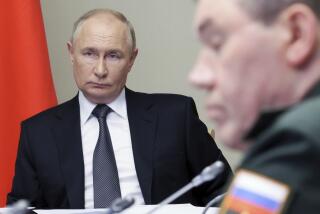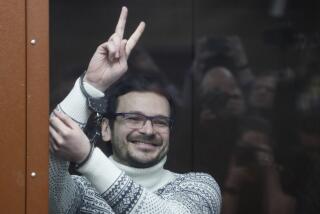Putin foe Alexei Navalny stopped at airport, barred from leaving Russia
Russian border guards blocked opposition leader Alexei Navalny from flying out of the country on Tuesday, in a move the Kremlin critic said was meant to prevent him from attending a final hearing on his case in Europe’s highest human rights court.
Navalny, whose anti-corruption protests have made him President Vladimir Putin’s biggest political irritant, announced first on his Instagram page that border guards at Moscow’s Domodedovo airport had taken his passport and pulled him aside as he was going through passport control. On Twitter, he said border guards had told him a ruling by court bailiffs barred him from leaving Russia.
“Border guards are saying that leaving is forbidden for me. There is some kind of letter that says I am prohibited from leaving, but there is no explanation why,” Navalny tweeted early Tuesday. His lawyer, Ivan Zhdanov, tweeted a photo of the vaguely worded document.
Navalny, 42, was on his way to Strasbourg, France, to hear a verdict on a case he filed with the European Court of Human Rights examining whether his numerous detentions during protests in Russia were politically motivated. The court was expected to rule Thursday.
“The ECHR will soon announce its ruling on whether or not my numerous detentions were politically motivated,” Navalny posted on Twitter a few hours after being turned back at the border. “Apparently, Putin’s regime thinks that not letting me fly to Strasbourg to hear this ruling will change anything.”
A Moscow lawyer whose focus on corruption among Russia’s political elite has included investigations into high-ranking members of Putin’s inner circle, Navalny came to prominence during mass political protests against the government in 2011 and 2012.
Navalny later challenged a Kremlin-backed incumbent candidate for Moscow mayor. He lost but got a surprising 30% of the vote, stoking fears in the Kremlin that there might be a viable political opposition to Putin’s rule.
Later that year, Navalny faced fraud and money laundering charges that he said were politically motivated. Navalny took the case to the European Court of Human Rights, which last year ruled that the convictions against him and his brother, Oleg, were “arbitrary and manifestly unreasonable” and ordered Russia to pay him compensation.
Since then, Navalny’s YouTube channel has gained a huge following, particularly with young Russians.
His Anti-Corruption Foundation has conducted several investigations into the lavish lifestyles of Kremlin elite, and posted the reports on YouTube. The foundation’s video reports garner millions of viewers.
In 2017, Navalny organized national anti-corruption protests, which quickly turned into anti-government demonstrations, with participants holding signs and banners declaring Putin a thief and demanding his resignation.
Police crackdowns on the protests resulted in thousands of arrests and detentions across the country, including of minors.
Navalny has been arrested and has served several 30-day sentences for organizing unsanctioned protests. He was released last month from his latest 20-day stint in a Moscow jail for organizing protests of the Kremlin’s controversial pension reforms.
In March, Navalny’s attempt to challenge Putin’s reelection campaign was thwarted by a court ruling saying his previous criminal convictions precluded him from running.
Twitter: @sabraayres
Ayres is a special correspondent.
More to Read
Sign up for Essential California
The most important California stories and recommendations in your inbox every morning.
You may occasionally receive promotional content from the Los Angeles Times.










